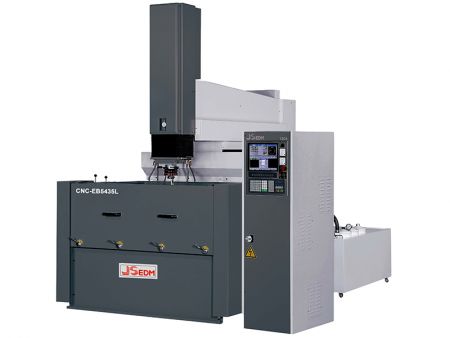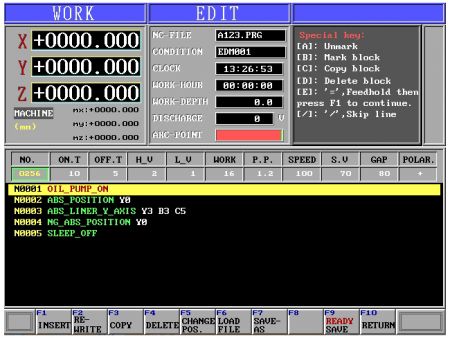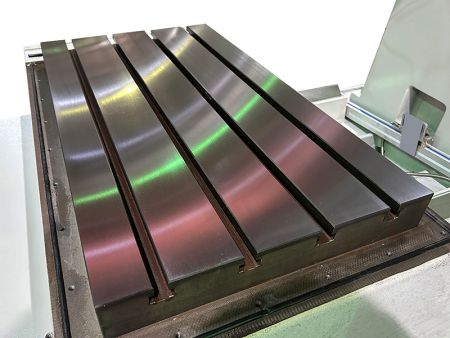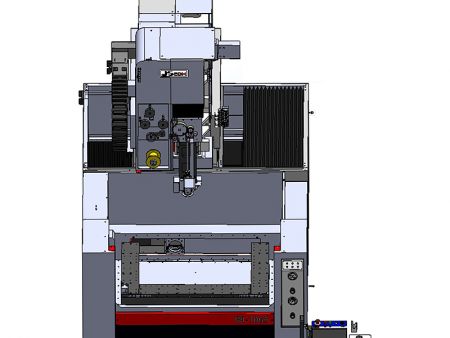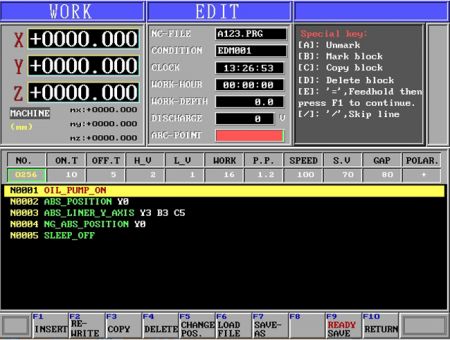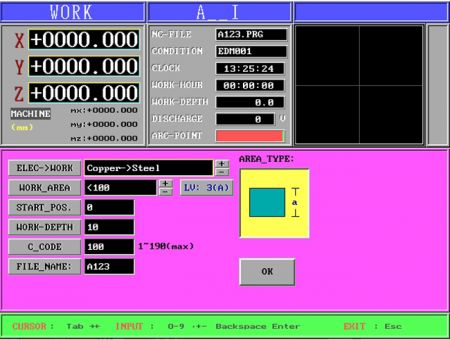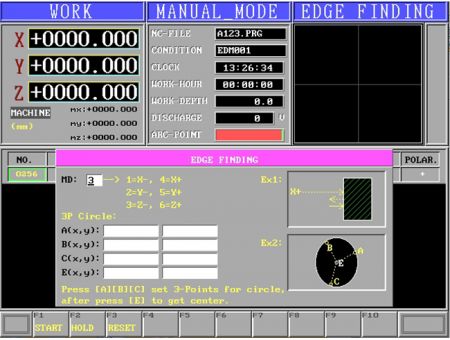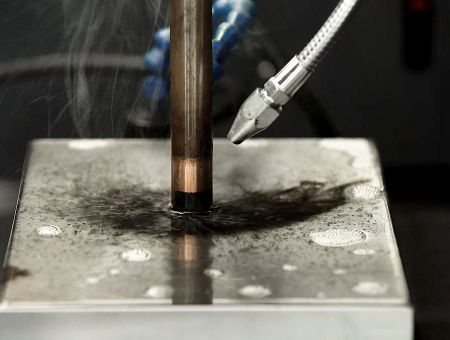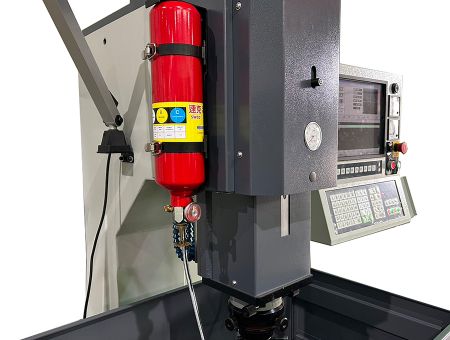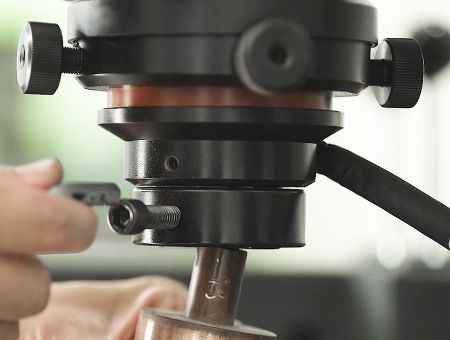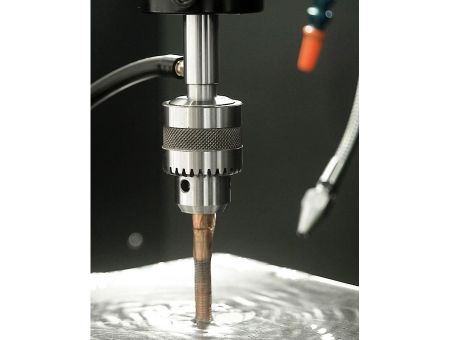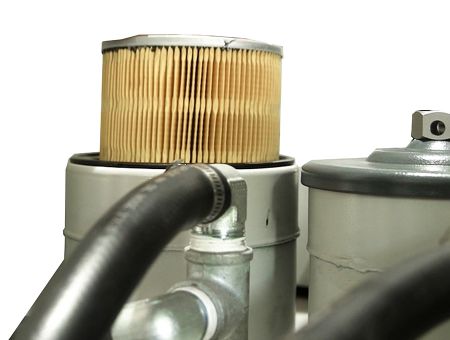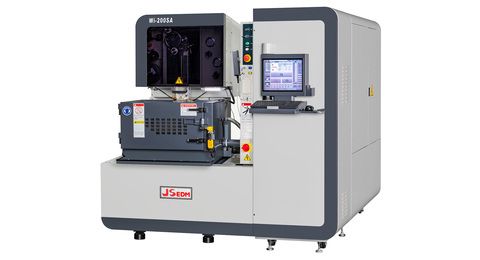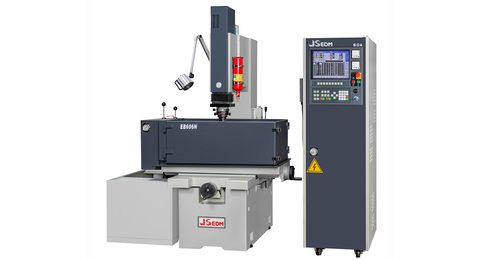JSEDM Column Moving-Type CNC EDM EB5435L: 500/400/350mm XYZ Travel for Heavy Workpieces
JSEDM's EB5435L Column Moving-Type CNC EDM features 500/400/350mm XYZ travel, supports 2000kg workpieces, and offers high-precision machining with minimal electrode wear. This industrial-grade EDM machine includes AI auto-indexing, advanced servo control, and fire safety systems for optimal performance in precision mold manufacturing.
Column Moving-Type CNC EDM XYZ Travel 500 / 400 / 350
CNC-EB5435L
Column Moving-Type CNC Electrical Discharge Machine
The EB5435L is a high-performance CNC EDM machine, an upgraded version of the EB540L, offering greater machining capabilities and a broader range of applications. It features the same XYZ axis travel as the EB540L but utilizes a moving-column structure, making the worktable a fixed end, thereby ensuring the machine's stability and rigidity. This structural design enables the EB5435L to handle heavier workpieces and meet the demands of larger and more complex machining tasks.
In terms of key components, the EB5435L is equipped with precision-grade screws, linear guides, and other high-quality parts. The selection of these components ensures accuracy and reliability during the machining process, making the machine capable of handling various complex workpiece machining tasks.
Machine Introduction
The EB5435L is a moving-column type CNC EDM machine, featuring an X-axis travel of 500mm, a Y-axis travel of 400mm, a Z-axis travel of 350mm, and a worktable measuring 850mm x 450mm. The XYZ axis are fixed between the middle and upper sections, ensuring the worktable remains stable and enhancing the stability and precision when machining heavier workpieces. This design allows the EB5435L to excel in handling industrial-grade machining tasks.
The machine is equipped with high-quality servo motors from Japan's SANYO DENKI and a 1μm optical scale, ensuring machining accuracy and stability, making it a reliable tool for processing complex workpieces.
The EB5435L has a wide range of applications, and the following are three examples:
- Cooling Fan for Precision Machinery: The EB5435L is suitable for machining molds for precision machinery cooling fans, which are often used in electronic products and communication devices, offering efficient cooling capabilities. The machining by the EB5435L ensures precise fan mold dimensions, leading to effective cooling performance.
- Landline Telephone Speaker Ports, Cable Management Grooves, and Clips: The body area of landline telephones, including speaker ports, cable management grooves, and clips, can be produced using the moving-column machining method of the EB5435L, ensuring they meet standard dimensions and possess good functionality.
- Lighting Equipment: This includes molds for components like lamp covers and bases, which require high-precision machining to ensure the appearance and functionality of the lighting equipment. The high stability and precision of the EB5435L make it an ideal choice for machining these molds.
High-Rigidity Structure:
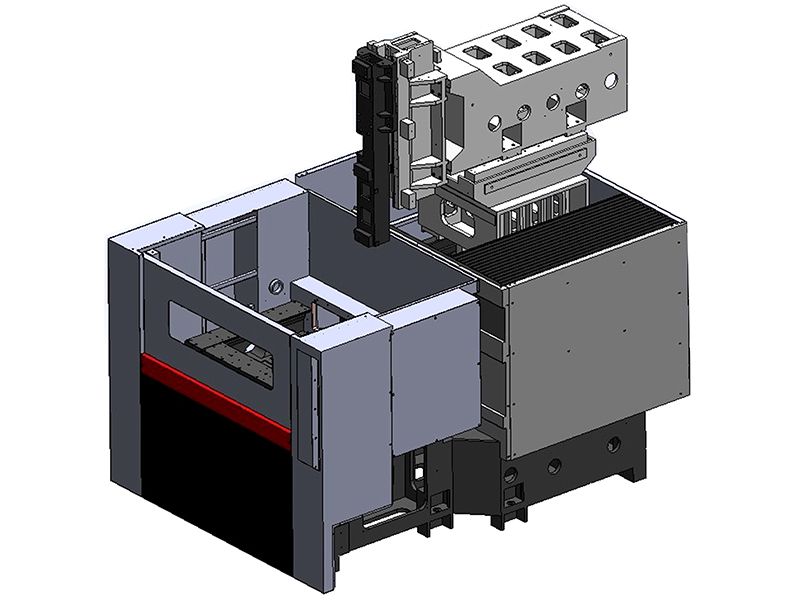
- The machine adopts a high-rigidity moving column structure capable of supporting workpieces up to 2000 kgs, reducing issues related to machine load and thermal deformation, thereby ensuring long-term precision.
- Made from Meehanite cast iron, the machine undergoes stress-relief heat treatment, providing a high-rigidity, symmetrically balanced base design. The worktable is heat-treated and precision-ground, making it wear-resistant and maintaining flatness even under heavy loads.
- The base design utilizes a moving column (bullhead type) structure, ensuring that the flatness of the workpiece on the table is not affected during movement, delivering optimal working precision. The robust base design prevents deformation even when subjected to long-term heavy loads.
Wide Linear Guide Span and Precision Ball Screw:
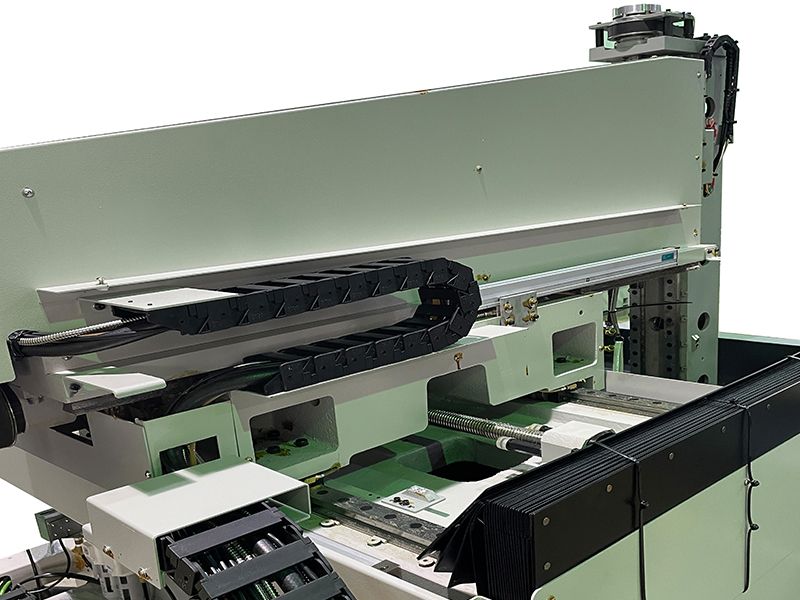
- The X and Y axes utilize low-friction linear guides, ensuring machine precision and smooth operation during its movement. The wide linear guide and span ensure accurate positioning and feed data during long-term back-and-forth and side-to-side movements, especially during reaming and vector machining, maintaining the machine's precision (backlash value) over time.
- The X-axis linear guide (Ψ 30mm) is mounted on the machine's middle base, ensuring flatness during installation and extending the lifespan of the guide, thereby maintaining machine accuracy.
- The Y-axis linear guide (Ψ 30mm) is installed on the machine's upper base, ensuring flatness during installation and lightness (without bearing weight) to reduce friction and extend the lifespan, thus permanently ensuring machine accuracy.
- The X-axis (Ψ 32mm) and Y-axis (Ψ 32mm) utilize precision-grade ball screws combined with low-friction linear guides to ensure machine accuracy.
Precision Spindle:
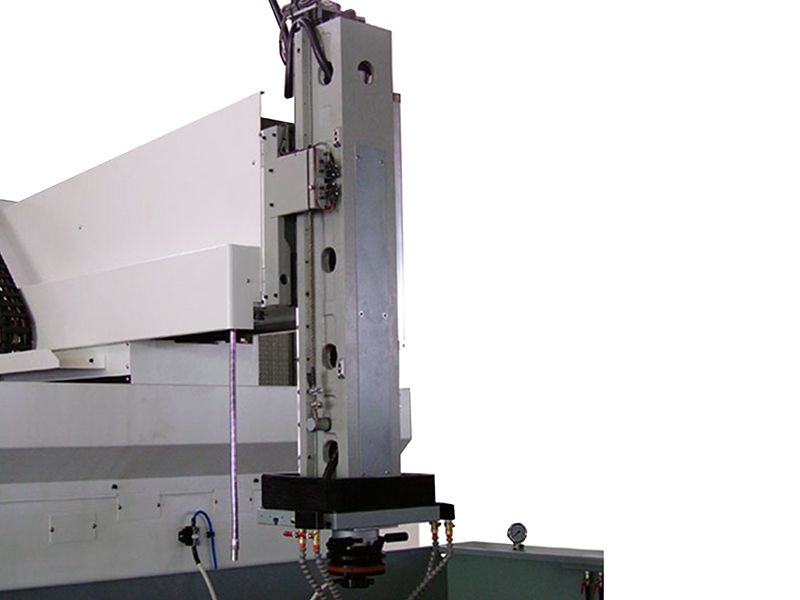
- The spindle section features an integrally cast design to ensure stability during large electrode machining. It also utilizes alloy steel guides (ψ30mm) combined with roller bearings, minimizing friction and ensuring spindle feed accuracy.
- The spindle tower is equipped with a 400W servo motor, making the spindle operation more lightweight (without counterweights) while ensuring precise displacement during operation and extending the lifespan of the ball screw (Ψ 25mm).
C-axis Features and Applications:
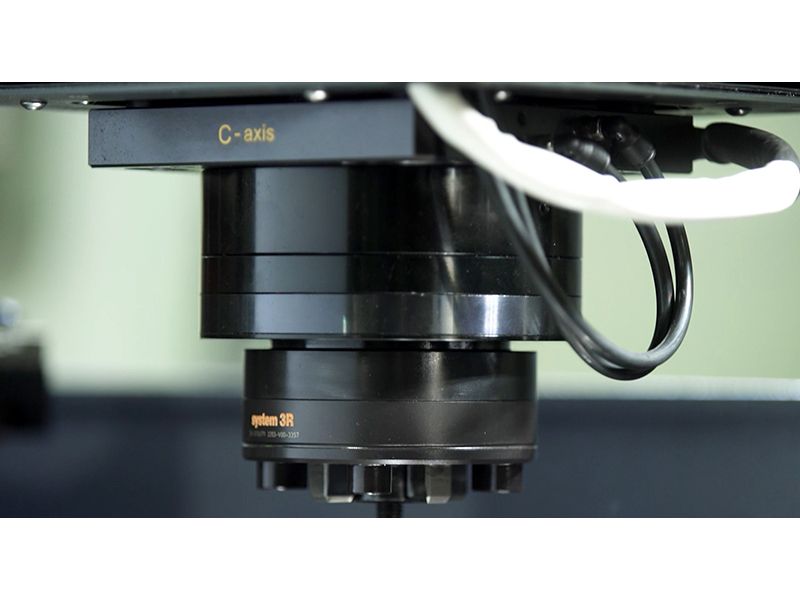
- The C-axis offers high-precision positioning capability, allowing for accurate positioning and rotation of parts during machining. This enables more precise machining and better results when working on parts that require rotational machining.
- The C-axis can perform indexing machining, which involves machining at fixed angles. This is particularly useful for parts requiring periodic or repetitive machining, improving consistency and efficiency.
- For parts with complex thread structures, the C-axis can facilitate thread machining. These thread structures may have unique shapes that require machining at various angles, and the rotational function of the C-axis allows for precise thread machining.
Automatic Tool Changer (ATC) and the Advantages of Automation:
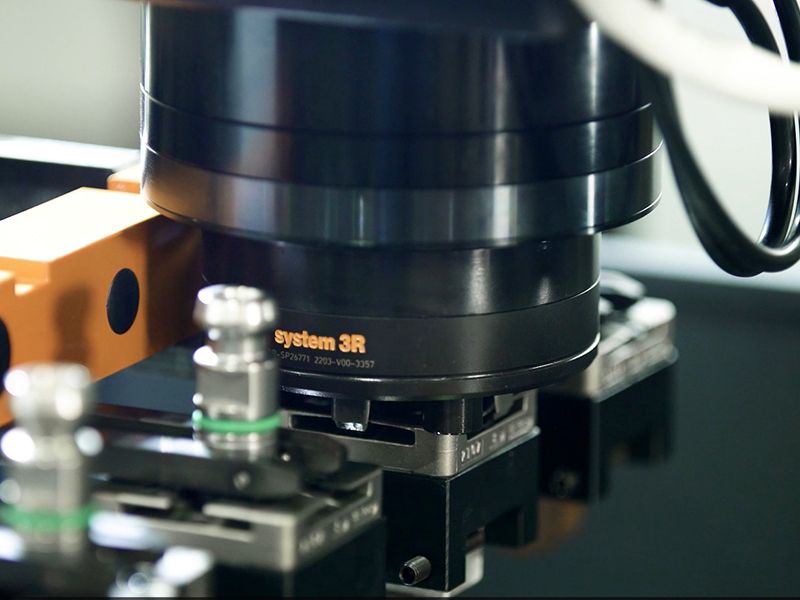
- Allows quick and precise tool changes, reduces tool change time and thereby increasing machining efficiency.
- Ensure that it is precise in every tool change, avoiding errors caused by human factors, which in turn improves machining accuracy.
- Can automatically complete tool changes during the machining process, reducing downtime and increasing machine uptime.
- Minimizes the need for manual intervention, reducing labor requirements while also lowering the risk of errors and accidents caused by human operation.
Controller Performance and Features
● Automatic Indexing: The system allows users to directly select material type and area, input machining depth and starting height, and then automatically search for the optimal conditions to generate the machining program. Users can also edit and save the generated program, which can be reloaded for future use without altering the original database content.
● High-Efficiency Discharge Module: The discharge circuit uses MOSFET transistors and a fast discharge device (POWER SINK) to enhance machining efficiency and reduce electrode wear. The machining circuit employs FPGA IC components for faster monitoring of discharge conditions (up to single discharge waveform monitoring), providing more effective prevention of carbon buildup (ARC). Users can set ARC voltage levels, ARC time, and ARC sensitivity to further improve machining efficiency. Additionally, it offers two-stage gap and two-stage off-time functions to assist users in automatically adjusting machining parameters when ARC occurs, leading to better machining efficiency. These features and designs aim to improve machining efficiency, reduce wear, and provide better operability and stability.
● Servo Control: The servo control system uses DSP digital processing, allowing for faster response times, with loop control occurring every 0.2ms, which is faster than the typical 1ms or more response time of PC-based controllers. This characteristic enhances spindle stability during machining, ensuring smoother machine operation.
Additionally, the CNC EDM machine offers a multi-stage debris removal mode, suitable for deep hole machining and thin sheet processing, providing more flexible machining options. Moreover, the servo protection function is an important feature that prevents electrode damage caused by improper user operation, such as mold crushing. This protection function ensures the safety and longevity of the electrode during the machining process.
These combined features make the CNC EDM machine's servo control more flexible, stable, and safe, capable of meeting various machining demands while ensuring high-quality machining results.
Product Specification
| Technical Spec. | |||
|---|---|---|---|
| Mechanical Structure | Column Moving-Type | Distance Between Platen to Table | 770mm |
| Work Tank Capacity L x W x H (mm) | 1250 x 800 x 520mm | Optical Scale Display | 1um |
| Work Table Size | 850 x 450mm | Max. Machining Current | 60A 90A (Optional) |
| X Axis Travel (Right-Left) | 500mm | ||
| Y Axis Travel (Front-Back) | 400mm | Min. Electrode Wear Ratio | 0.12% |
| Z Axis Travel | 350mm | Machine Weight | 2700kgs |
| Max. Workpiece Weight | 2000kgs | Fluid Tank Capacity | 850L |
| Max. Electrode Weight | 200kgs | Machine Outside Dimensions (W x D x H) | 2700 x 2250 x 2400mm |
- Gallery
- In this interface, you can input various machining programs such as vector machining, orbiting, side placement, and rectangular processing.
- The AI automatic indexing function allows users to directly select the material and area to be machined. After inputting the machining depth and starting height, the system automatically searches for the optimal conditions.
- The one-page multifunctional calibration includes edge finding, inner hole finding, outer circle finding, vertex finding, and circle center finding.
- When the fire sensor detects flames, it sends an alarm signal and pauses the machine to prevent a fire from occurring.
- When the worktable catches fire due to excessive oil temperature, the fire extinguisher is activated to extinguish the fire, providing a second layer of protection beyond the fire sensor.
- The adjustable electrode head allows for quick electrode replacement and adjustments for parallelism and verticality.
- The three-jaw chuck allows dielectric fluid to pass directly through the jaws and flow along the electrode into the mold, enhancing debris removal efficiency.
- The vertical filter cartridge design makes it easy to replace the filter and prevents the filter from breaking during replacement, avoiding spills of oil and metal debris.
How Does the EB5435L's Moving-Column Design Improve Precision for Heavy Mold Machining?
The EB5435L's moving-column design fundamentally transforms heavy mold machining by keeping the worktable stationary, eliminating flatness deviations common in traditional designs. With a 2000kg workpiece capacity and Meehanite cast iron construction that undergoes stress-relief heat treatment, the machine maintains exceptional rigidity even under sustained heavy loads. This structural advantage, combined with precision-grade ball screws and wide-span linear guides, ensures sub-micron accuracy is preserved throughout extended machining cycles—critical for complex, high-value molds requiring multiple operations.
What truly distinguishes the EB5435L is its comprehensive suite of advanced features designed to maximize productivity and precision. The machine incorporates Japanese SANYO DENKI servo motors paired with 1μm optical scale feedback for exceptional positioning accuracy. The intelligent control system offers AI automatic indexing, multi-functional calibration, and specialized machining functions including orbit, vector, and multi-hole rectangular processing. Safety features such as integrated fire sensors and automatic extinguishing systems provide peace of mind during extended operations. With a minimal electrode wear ratio of just 0.12% and optional 90A machining current, the EB5435L delivers outstanding performance across diverse applications including precision cooling fans, telecommunications components, and industrial lighting equipment molds.

